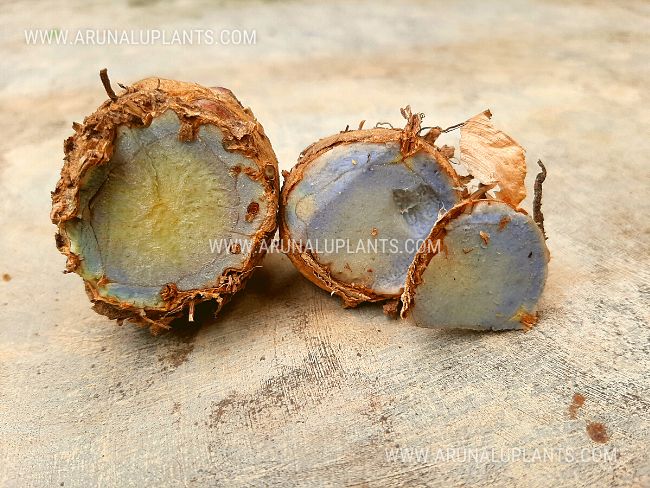Description
කලු කහ වල ඖෂධීය ගුණ මොනවාද?
කළු කහ, කාලි හල්දි (Kali Haldi) හෝ ක්රිෂ්ණා කේදාර් (Krishna Kedar) හා දෙමල භාෂාවෙන් கருமஞ்சள் (කරු මන්ජල් ) ලෙසද හැඳින්වේ, ආයුර්වේදයේ සහ ඉන්දියාව තුල දුර්ලභ හා ඉහළ වටිනාකමක් ඇති ඔසු පිණිස ලබාගන්නා කලු කහ හා බැඳි ආගමික විශ්වාසයන් රාශියක් ද පවතී. කලු කහ වල ඇති ඖෂධීය ගුණ අතර,
- ප්රති-ගිනි අවුලුවන ගුණ: කලු කහ වල curcumin අඩංගු වන අතර එය ප්රබල ප්රති-ගිනි අවුලුවන ගුණ ඇති අතර එය ශරීරයේ දැවිල්ල අඩු කිරීමට සහ නිදන්ගත රෝග වළක්වා ගැනීමට උපකාරී වේ. (Chattopadhyay, 2004)
- ආහාර දිරවීම: කලු කහ ආහාර දිරවීම වැඩි දියුණු කිරීමට සහ අජීර්ණ, බඩ පිපීම සහ මලබද්ධය වැනි ආමාශ ආන්ත්රයික ගැටළු සමනය කරයි. (Kumar, 2012)
- ප්රතිශක්තිකරණය වැඩි කිරීමට : කලු කහ ප්රතිශක්තිකරණ පද්ධතිය වැඩි දියුණු කිරීමට උපකාරී වන අතර ශරීරය ආසාදන හා රෝග වලට වඩා ප්රතිරෝධී කරයි. (Aggarwal, 2010)
- ප්රතිඔක්සිකාරක ගුණ: කළු කහ වල ප්රතිඔක්සිකාරක අඩංගු වන අතර එය වයස්ගත වීම සහ නිදන්ගත රෝග සමඟ සම්බන්ධ වන නිදහස් රැඩිකල් හානිවලින් ශරීරය ආරක්ෂා කිරීමට උපකාරී වේ. (Kumar, 2012)
- ශරීරයේ ඇතිවන වේදනා වලට: ආතරයිටිස්, ඔසප් කැක්කුම සහ හිසරදය වැනි තත්වයන් සමඟ සම්බන්ධ වේදනාව සහ දැවිල්ල සමනය කිරීමට කළු කහ භාවිතා කළ හැකිය. (Aggarwal, 2010)
- පිළිකා නාශක ගුණ: කළු කහ වල පිළිකා මර්දන ගුණ ඇති බව පෙන්වා දී ඇති සංයෝග අඩංගු වන අතර, එය පිළිකා වැළැක්වීමේ සහ ප්රතිකාර කිරීමේ විභව චිකිත්සක කාරකයක් බවට පත් කරයි. (Thangapazham, 2008)
- සම ආශ්රිත ගැටලු: කළු කහ මගින් සමේ සෞඛ්යය වැඩි දියුණු කළ හැකි අතර කැළැල්, කුරුලෑ සහ අනෙකුත් සමේ තත්ත්වයන් අඩු කරයි. (Sultana, 2010)
- ශ්වසන පද්ධතිය: කළු කහ ඇදුම සහ බ්රොන්කයිටිස් වැනි ශ්වසන රෝග සමනය කිරීමට උපකාරී වේ. (Kumar, 2012)
- ආතතිය: කළු කහ ලිහිල් කිරීම සහ මනස සන්සුන් කිරීම ප්රවර්ධනය කිරීමෙන් ආතතිය සහ කාංසාව අඩු කිරීමට උපකාරී වේ. (Chattopadhyay, 2004)
- හෘද සෞඛ්යයට: කළු කහවලට රුධිර පීඩනය අඩු කිරීමෙන්, රුධිර සංසරණය වැඩි දියුණු කිරීමෙන් සහ ධමනි තුළ plaque ඇතිවීම වළක්වා ගැනීමෙන් හෘද වාහිනී සෞඛ්යය වැඩි දියුණු කළ හැකිය. (Aggarwal, 2010)
කලු කහ ඔබේ සෞඛ්යය තත්වය හොදින් පවත්වා ගැනීම සදහා භාවිතය ගතහැකි ඖෂධයක් ලෙස සැලකිය හැකියි. මෙම සාම්ප්රදායික භාවිතයන් එසේ උවත් වෛද්ය විද්යාත්මකව මේවායේ ගුණ තව දුරටත් වලංගු කිරීමට වැඩිදුර සායනික පර්යේෂණ අවශ්ය වේ. ඔබ යම්කිසි රෝගාබාධක් වෙනුවට මෙය විශේෂයෙන්ම භාවිත කරන්නේ නම් ඒ පිළිබඳ පිළිගත් වෛද්යවරයෙකුගෙන උපදෙස් ගැනීම වඩාත් යෝග්ය වේ
What are the Health Benefits of Black Turmeric
Black Turmeric, also known as Kali Haldi or Krishna Kedar, is a rare and highly valued herb in Ayurveda and traditional medicine. Some of its benefits include:
- Anti-inflammatory properties: Black Turmeric contains curcumin, which has potent anti-inflammatory properties that can help reduce inflammation in the body and prevent chronic diseases. (Chattopadhyay, 2004)
- Digestive health: Black Turmeric can improve digestion and alleviate gastrointestinal issues such as indigestion, bloating, and constipation. (Kumar, 2012)
- Immune system booster: Black Turmeric can help boost the immune system, making the body more resistant to infections and diseases. (Aggarwal, 2010)
- Antioxidant properties: Black Turmeric contains antioxidants that can help protect the body from free radical damage, which is associated with aging and chronic diseases. (Kumar, 2012)
- Pain relief: Black Turmeric can be used to alleviate pain and inflammation associated with conditions such as arthritis, menstrual cramps, and headaches. (Aggarwal, 2010)
- Anti-cancer properties: Black Turmeric contains compounds that have been shown to have anti-cancer properties, making it a potential therapeutic agent in cancer prevention and treatment. (Thangapazham, 2008)
- Skin health: Black Turmeric can improve skin health and reduce the appearance of scars, acne, and other skin conditions. (Sultana, 2010)
- Respiratory health: Black Turmeric can help alleviate respiratory conditions such as asthma and bronchitis. (Kumar, 2012)
- Stress relief: Black Turmeric can help reduce stress and anxiety by promoting relaxation and calming the mind. (Chattopadhyay, 2004)
- Cardiovascular health: Black Turmeric can improve cardiovascular health by reducing blood pressure, improving circulation, and preventing the buildup of plaque in the arteries. (Aggarwal, 2010)
References:
- Aggarwal, B. B., & Harikumar, K. B. (2010). Potential therapeutic effects of curcumin, the anti-inflammatory agent, against Alzheimer’s disease and other chronic diseases. Advances in experimental medicine and biology, 662, 25-49.
- Chattopadhyay, I., Biswas, K., Bandyopadhyay, U., & Banerjee, R. K. (2004). Turmeric and curcumin: biological actions and medicinal applications. Current science, 87(1), 44-53.
- Kumar, G., Srivastava, A., Sharma, S. K., Rao, T. D., & Gupta, Y. K. (2012). Anti-ulcerogenic effect of black turmeric (Curcuma caesia Roxb) in stress-induced ulcer in rats. Journal of Ethnopharmacology, 141(1), 187-194.
- Sultana, S., Ahmed, S., Jahangir, T., Sharma, S., Inamdar, M. N., & Patel, I. (2010). Evaluation of Curcuma caesia Roxb. for anticancer activity and induction of apoptosis. Journal of ethnopharmacology, 124(3), 506-512.
- Thangapazham, R. L., Sharad, S., Maheshwari, R. K., & Sharma, A. (2008). Anti-inflammatory and anti-tumor activities of β-elemene, a component of nutgrass (Cyperus rotundus L.). International immunopharmacology, 8(2), 180





















Reviews
There are no reviews yet.